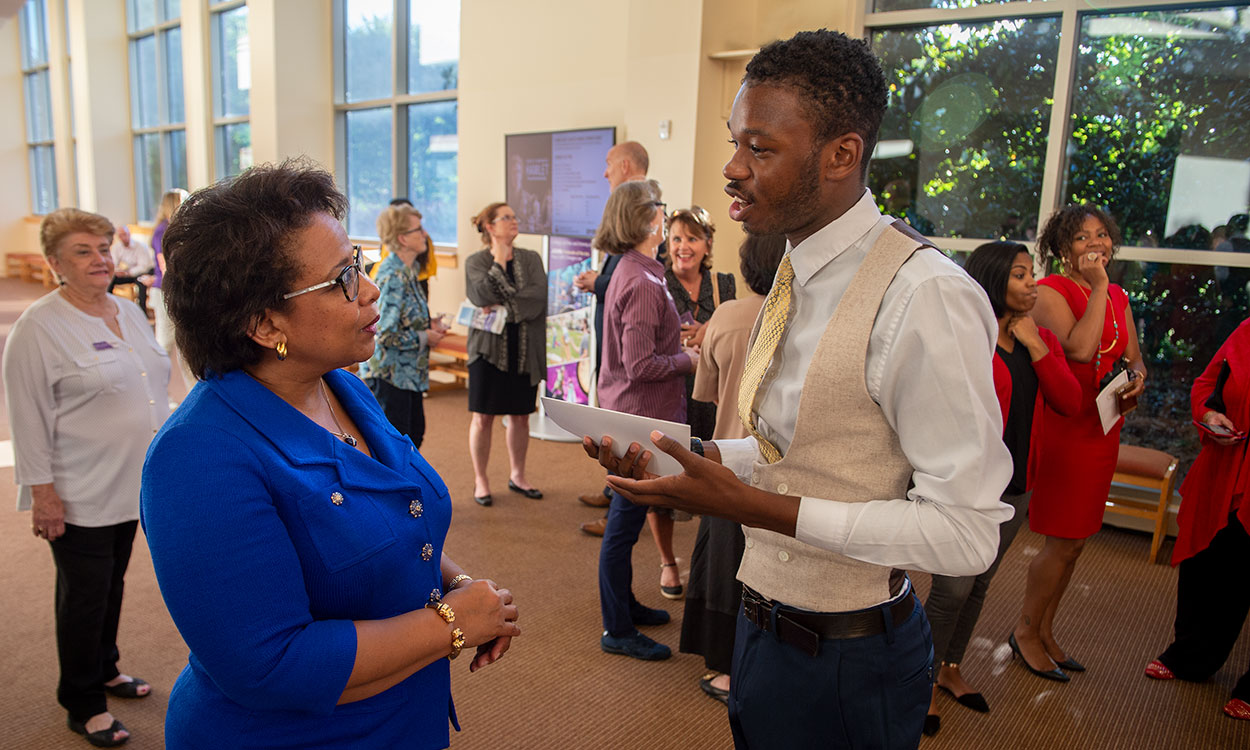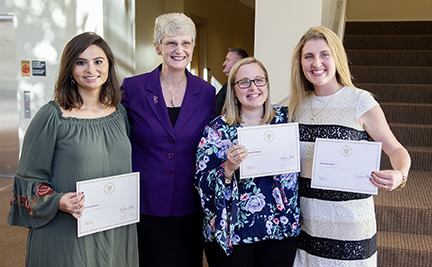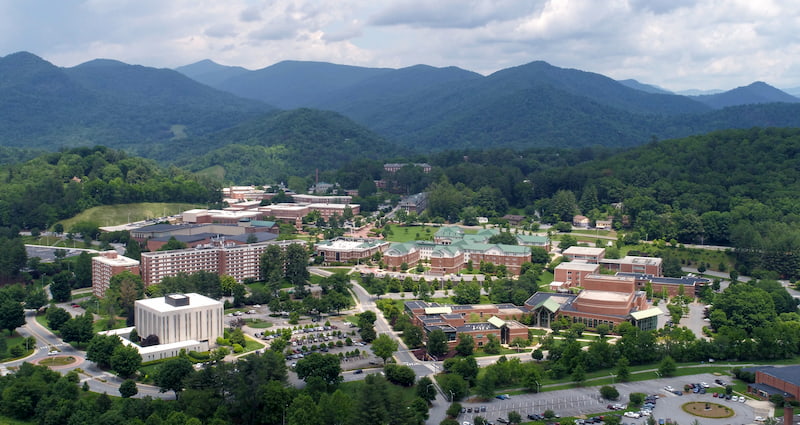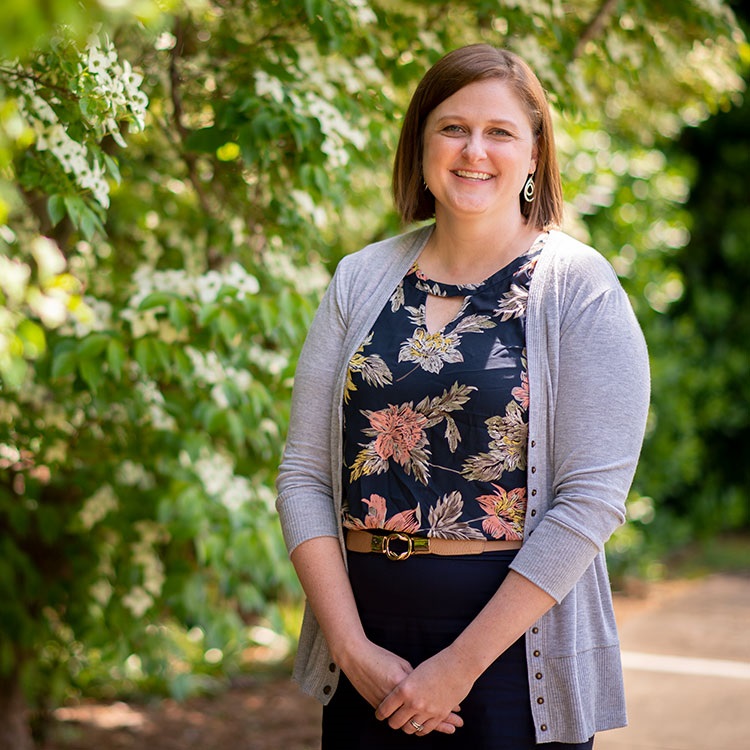Former U.S. attorney general provides prescription for divided nation during campus visit

WCU political science major David Benoit speaks with former U.S. Attorney General Loretta Lynch during a reception held after the chancellor's list ceremony.
Former U.S. Attorney General Loretta Lynch spoke adoringly about two acquaintances who died recently – U.S. Sen. John McCain and renowned soul singer Aretha Franklin – and provided a prescription for the nation’s political and racial divides as she delivered a keynote address before a group of Western Carolina University’s highest-achieving students Tuesday (Sept. 18.)
Lynch, a Greensboro native who served as the country’s chief law officer for two years under former President Barack Obama, visited the WCU campus to speak to students being recognized for superior academic performance that resulted in them being included on the university’s chancellor’s list for last spring, a designation requiring a GPA of 3.8 or better. The ceremony in the performance hall of the John W. Bardo Fine and Performing Arts Center also was attended by the students’ faculty and staff mentors as well as by families and friends.
After congratulating the students for their accomplishments inside and outside the classroom, Lynch reflected on the lives of McCain and Franklin. They were “two great Americans, both of whom used their considerable talents and life experiences for the benefit of others,” she said.
“One would be hard-pressed to find better examples of service and achievement to emulate,” Lynch said. McCain and Franklin “lived and moved in very different worlds, but what they had in common was they gave of themselves freely and wholeheartedly to causes larger than themselves, and also to causes that seemed insurmountable at the time,” she said.
McCain’s military service included time as a prisoner of war in North Vietnam, but he later worked to open relations between Vietnam and the U.S. despite the fact that that country “was the source of his greatest pain,” Lynch said. And Franklin “supported the civil rights movement in its darkest and most uncertain days – the ’50s and ’60s – with her talents and her drive. Certainly, neither work that they gave themselves to is finished, but their faith and tenacity moved both causes light-years ahead,” Lynch said.
“As many of you know, just from looking around the world outside this beautiful valley, we are surrounded by seemingly insurmountable issues today,” she said. “To say our country is divided is to utter a profound understatement. We are divided on issues of race. We are divided on issues of our economy. We are divided on literally what it means to be an American. And, we know we’re divided because we shout our strongly held opinions at each other every day. But both John McCain and Aretha Franklin knew that no problem, not even those that go to the heart of who we are as a people, as a country, are insurmountable if we choose to hold on to this country’s highest ideals.”
Lynch said law enforcement and community relations was one of the most difficult issues she faced as U.S. attorney general, and at times it seemed like a video of the shooting of an African-American man at the hands of police was appearing each month.
Lynch said she and her team “chose to believe that people of good will and strong commitment, even if they have wildly different views, could find common ground.” They embarked on a community policing tour to six cities around the nation that had made “real progress” in dealing with the police-community challenge. “In all of these cities, ordinary people sat down together and decided, ‘we can save our communities,’” she said. “Community members had to truly see the people behind the uniform. Law enforcement had to truly see the differences between those who threaten the community and those who want to save the community, and they had to recognize the real pain inflicted when they lump everyone together, and both sides had to commit to real change.”
“I’m not saying every city became perfect, but every one of those cities ultimately created a bridge to communication and a way to talk about the hard issues of keeping people safe, and they did it as a team,” Lynch said. “When we choose to truly see and hear each other, nothing is impossible.”
“I choose to believe there is a path to bring us back together,” she said. “I choose to believe that what binds us together is and always has been stronger than what drives us apart. And so, I have a challenge for all of you here tonight.” Lynch then outlined for the audience her “choose to listen challenge,” which has two parts – “find someone with whom you disagree, and choose to listen.”
“The true challenge here is not to jump back into an argument, where you think if you just say it louder or list facts, the other party is going to have to agree. The hard part here is to skip that part and ask three questions of this person with whom you profoundly disagree,” she said.
“The first question is, why do you feel that way? Second question is, why is this so important to you. Third question is, what is your biggest concern when you hear my view or the other point of view? And then you choose to listen.” The process then gets more difficult “because you have to answer those questions yourself,” Lynch said.
“I’m not asking you to change your mind or go against a deeply held belief,” she said. “But, I am asking you to choose to listen. And when you get up from that conversation, you can still agree to disagree, but it will be from a position of understanding and not contempt, and from understanding grows connection, and from connection grows cooperation, and from cooperation grow solutions that you will have never considered before.”
Lynch told audience members that she hopes after they choose to listen they “will choose to take action in a way that incorporates what you’ve heard, in a way that respects what you’ve heard, but that still advances the things that are important to you.”
“As the end of the day, all of us, no matter our platform or position, just want to be heard – that, and a little R-E-S-P-E-C-T,” she said, referring to the title of Franklin’s best-known hit song.

Chancellor's list students (from left) Gianna Gerard, Julia Trimberger and Amanda Weaver take advantage of a photo opportunity with Interim Chancellor Alison Morrison-Shetlar.
In her remarks, WCU Interim Chancellor Alison Morrison-Shetlar congratulated the honored students and said they should be proud of their accomplishments. “Students who have earned this prestigious award are role models as university citizens, having demonstrated their commitment to academic and personal excellence,” Morrison-Shetlar said. “It is with great pride that I say to each student who is here today – my heartfelt congratulations.”
A total of 1,423 students were named to the chancellor’s list for spring semester 2018.
In closing the ceremony, WCU Acting Provost Carol Burton asked the students to take the time to thank all those who have supported them during their journeys to academic success. Burton encouraged them “to be well-rounded and contributing citizens and representatives of this university and of this glorious state.”
“I want each one of you to be the game-changers, the problem-solvers, the inventors, the creators and the difference-makers in our world,” she said. “I stand here with great pride recognizing each of you for your commitment to excellence and your hard work during the spring semester and beyond.”
Lynch’s visit at WCU was part of the university’s new Distinguished Lecture Series and was organized by the Office of Student Transitions.

